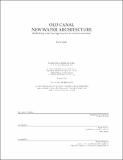Old canal new water architecture : rethinking water heritage tourism in rural environment
Author(s)
Qian, Jie, M. Arch. Massachusetts Institute of Technology
DownloadFull printable version (91.87Mb)
Alternative title
Rethinking water heritage tourism in rural environment
Other Contributors
Massachusetts Institute of Technology. Department of Architecture.
Advisor
James Jr. Wescoat.
Terms of use
Metadata
Show full item recordAbstract
In the context of growing cultural tourism, water heritage becomes a unique topic for its inherently multi-scale cultural, social and environmental aspects; and its potential to become a "living heritage" by incorporating local participation in a comprehensive development. This is nowhere clearer than in China, where rapid development in urban and rural area and large scale state sponsored water infrastructure project creates the tension between heritage conservation, local economy and environment protection. Currently, there're very few examples how architecture and landscape design can address this tension and potential. The thesis develops a twofold argument for an interdisciplinary water problem: From the hydro-social and geo-political perspective, the thesis continues to investigate the question raised by Karl August Wittfogel and his successors: how can a centralized state use water infrastructure as an apparatus for coordination and political control and how the folk develop their own social norm and cultural custom in adaption to the state project? From the architectural and cultural-geographic perspective, it embraces the indeterminacy and duality of water metaphorically and materially, following Charles Moore's trajectory. The thesis seeks to establish a mutual benefit relationship between the state and the folk by integrating cultural tourism in a water infrastructural development; And to develop a new water architecture which express the essence of temporality in materiality and stimulate the "living heritage" through community engagement.
Description
Thesis: M. Arch., Massachusetts Institute of Technology, Department of Architecture, 2016. This electronic version was submitted by the student author. The certified thesis is available in the Institute Archives and Special Collections. Cataloged from student-submitted PDF version of thesis. Includes bibliographical references (pages 130-131).
Date issued
2016Department
Massachusetts Institute of Technology. Department of ArchitecturePublisher
Massachusetts Institute of Technology
Keywords
Architecture.